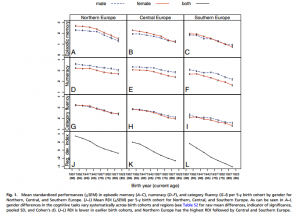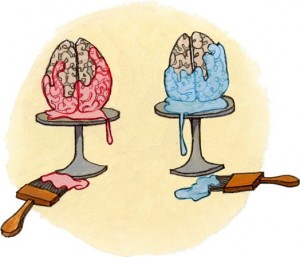The Changing Face of Cognitive Gender Differences in Europe
By: Nikki McCurryCognitive gender differences are a (hot) topic that results in a considerable amount of scientific and political debate. In order to better understand the magnitude and pattern of cognitive gender differences, scientists across Europe investigated the association of improved living conditions and education with gender differences among middle-aged and older adults in Europe. (If science isn’t your thing and you’re feelin’ philosophical, click here to skim a book about cognitive gender differences.)
Using data from the Survey of Health, Aging and Retirement in Europe, SHARE, men and women above the age of 50 answered demographic questions and cognitive tests assessing episodic memory, numeracy and category fluency.
In short, scientists were looking to see how time affected memory, who could do math better, and the vocabulary of the participant. SHARE used approximately 31,000 participants from 13 countries, but for the sake of this specific study, the 13 countries were merged into three geographical regions: Denmark and Sweden as Northern Europe; Austria, Belgium, Czech Republic, France, Germany, The Netherlands, Poland and Switzerland as Central Europe and Greece, Italy and Spain as Southern Europe. Think of it like a game show – the men and woman of Northern Europe, Central Europe and Southern Europe are battling against each other in the cognitive battle of the century. Who will come out on top – will the women come together to get a better overall score, or will the men and women work together to bring their region to victory?
In order to test episodic memory, the adults were read a list of 10 words and then after a brief pause, asked to repeat the words in the correct order. In regard to episodic memory, women in Northern Europe perform at a higher level than men across all categories, while in Central Europe, only women born in 1932 or later had significant gain over their male counterparts.
The woman of Southern Europe must’ve not brought their A-game to the arena, because there was a very small female advantage. By looking at the graphs, it seems as if the games of episodic memory were a battle of the sexes while overall, Northern Europe had a noticeable lead.
In order to test numeracy skills, participants were asked five basic word problems. The male advantage was clear in the data represented by the numeracy category, as the results of men and women never cross throughout the graphs of Northern, Central, and Southern Europe.
In order to test category fluency, participants were asked to name as many different animals as possible in one minute. The test involving word recall offered no significant difference between men and woman in Northern Europe, but in Central Europe and Southern Europe, there was a tendency for men to outscore women. 
Conclusively, the study revealed differences in regions and cognitive task, showing that the younger adults performed better than the older adults, while the adults in the north performed better than the central and southern regions. (But let’s be clear that no one in this study was particularly young.) Further analysis of the recorded data allowed researchers to explain that the differences in years of education are associated with the magnitude of gender differences.
Results allowed researchers to conclude that if both woman and man have the same level of education, women could better remember words over a set amount of time, men would be better with numbers, and both genders would perform equally in word recall.
To test the effects of living conditions on cognitive stimulation, a regional development index was created for each age group and country. Each country’s GDP, total fertility rate from the year participants were 25, infant mortality rate and life expectancy for the year participants were 37, and national educational levels from the years the participants were 45-49 years old. By comparing RDI’s, results show that as living conditions and educational levels rose, women have an increased cognitive performance. It’s interesting to think what the results would have led to had the study followed a younger generation, considering education among adolescents is roughly the same across genders at this point in time. Time will tell, but until then, score one for women.
Works Cited
Weber, Daniela. “The Changing Face of Cognitive Gender Differences in Europe.” PNAS. PNAS. Web. 24 Nov. 2014.
doi: 10.1073/pnas.1319538111
